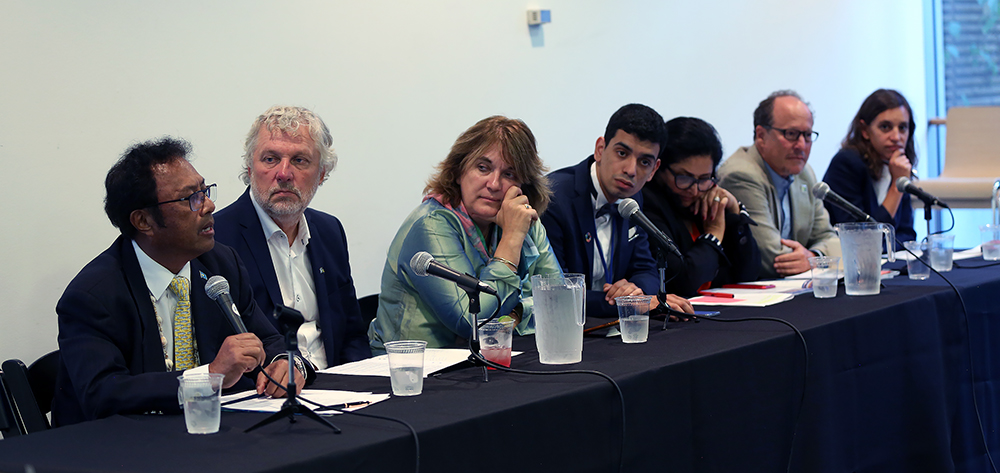Planetary Health Dialogue in New York
Co-organized by the Non-communicable Diseases (NCD) Alliance, UN Development Programme (UNDP), World Health Organization (WHO) and the International Institute for Sustainable Development (IISD), the Planetary Health Dialogue aimed to support exchange between the environment and health communities on the linkage between climate change and NCDs, present existing and novel strategies to accelerate action towards planetary health, and identify windows of opportunity to implement measures across the two sectors.

Tood Harper, President of the NCD Alliance, outlined health impacts of climate change and stated that air pollution is responsible for 7 million premature deaths annually worldwide. Noting that climate change and air pollution are fundamental health and security threats, he invited participants to share lessons learned on how to protect the planet and people at the nexus of environment and health.
Howard Frumkin, Head, Our Planet, Our Wealth Programme, Wellcome Trust, moderated a panel discussion on NCD and climate change.
Lourdes Sanchez, Policy Advisor, IISD, outlined the rationale for the report titled ‘Burning Problems, Inspiring Solutions: Sharing Lessons on action against tobacco and fossil fuels,‘ which argues that governments should treat fossil fuels in the same way they treated tobacco – as the root cause of a global health crisis. She explained that fossil fuels resemble tobacco in that they cause air pollution, involve global scale industries, and have similar addictive effects, noting that, like nicotine addiction, dependence on fossil fuels makes it difficult to reduce consumption.
Tommy Remengesau Jr., President, Palau, explained how climate change is causing an obesity crisis in Palau because diminishing fish stocks are increasing the dependence of Palauans on less healthy imported food. He reported that Palau has set aside 70% of its exclusive economic zone as no-take zone to allow fish stocks to recover.
Peter Eriksson, Minister of International Cooperation and Foreign Aid, Sweden, said that while the linkages between climate change and health have been discussed for four decades, there are still too few policy makers that understand them sufficiently to take action.
Mandeep Dhaliwal, Director, HIV, Health and Development, UN Development Programme (UNDP), called for more collaboration between UN organizations, highlighting UNDP’s work to help countries integrate health into their nationally determined contributions (NDCs) under the Paris Agreement on climate change.
Agnés Soukat, Director for Health Systems, Governance and Financing, WHO, described the theory and practice of health taxes, calling them third-generation fiscal instruments that shape markets and change behavior rather than raising funds for government or redistributing income. Noting that health costs have been increasing faster than average GDP growth, she suggested that health taxes can both improve health and reduce costs caused by NCDs.
Tarek Ezzine, Liaison to Public Health, International Federation of Medical Students Associations (IFMSA), said he believes that universal health coverage, halting climate change, and saving the environment can be achieved together because youth is beginning to demand radical change. He said he is supporting the inclusion of climate change in health curricula to enable him to become a socially responsible doctor.
Josh Karliner, International Director of Program and Strategy, Health Care Without Harm, noted that the first report evaluating the carbon footprint of the health system revealed that if health care was a country, it would be the world’s fifth largest emitter. He underscored that the voice of health professionals and health students is essential in reducing the health system’s carbon footprint and help address climate change.
Participants discussed inter alia, the strong positive effects of improving air quality on health; the strong relation between a healthy natural environment and good mental health; and the need to prioritize biodiversity and water under the planetary health discussion. Others highlighted the primacy of political will among drivers for change. They also discussed the vulnerability of hospitals to climate change and if climate change vulnerability is analyzed by donor countries and development agencies before deciding about funding allocations.
Read full coverage from Reporting Services
